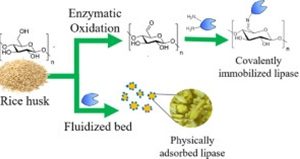Mariachiara Spennato, Anamaria Todea, Livia Corici, Fioretta Asaro, Nicola Cefarin, Gilda Savonitto, Caterina Deganutti, Lucia Gardossi
EFB Bioeconomy Journal, Volume 1, 2021, 100008 https://doi.org/10.1016/j.bioeco.2021.100008
Abstract
Rice husk is an underexploited, low density and highly robust composite material, massively available from rice processing. Here we report two new procedures for the formulation of immobilized lipases applicable in fats and oils transformations. The enzymes were covalently anchored on aldehyde groups introduced on rice husk by laccase-catalysed oxidation of the cellulose component. The method avoids the use of toxic glutaraldehyde while allows for the application and recycling of the biocatalysts in aqueous media. The second method used a fluidized bed granulator for the coating of the particles of rice husk (200–400 𝜇m) in the presence of water-soluble binders. The formulations are mechanically stable and suitable for applications in different hydrophobic media. Both methods allow for the recovery and reuse of the rice husk at the end of the life cycle of the biocatalysts.
